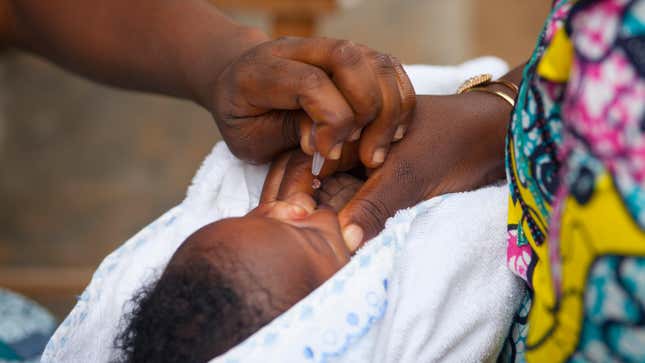
The nearly extinct disease polio has made an unexpected and unwelcome reappearance in Africa. This week, health officials in the country of Malawi reported a case of wild polio in a young child—the first spotted in the continent in more than five years. World Health Organization officials are now monitoring the situation.
Polio is a highly contagious disease usually spread through person-to-person contact (often via feces but sometimes sneezes or coughs). About three-quarters of those infected will experience no illness at all, while most of the rest will develop flu-like symptoms. More rarely, the virus can cause neurological symptoms, ranging from muscle weakness to a debilitating and sometimes fatal paralysis. Some percentage of survivors can also experience similar symptoms decades later, which is known as post-polio syndrome.
The virus used to infect millions a year and paralyzed tens of thousands of Americans, often children, during major outbreaks around the mid-20th century. With the help of effective vaccines since the 1950s, though, polio has been steadily beaten back. It’s on track to become the second (or possibly third) infectious disease of mankind to be fully wiped out. In 2021, there were only five wild polio cases reported in two countries, Pakistan and Afghanistan, and just a year earlier, the WHO certified that Africa had become wild polio-free, after years of surveillance had found no signs of circulation—both of which makes this recent case all the more disheartening.
The Malawi case involves a 3-year-old girl who tragically developed paralysis in November 2021. In late November, her stool samples were collected, and by February, testing confirmed that she had indeed contracted polio. Genetic analysis of her infection indicates that it originated from a strain from Pakistan dating back to 2019. Because the case appears to have been imported from there, it won’t affect Africa’s polio-free status for now, but the news is troubling nonetheless.
“As long as wild polio exists anywhere in the world all countries remain at risk of importation of the virus,” said Matshidiso Moeti, World Health Organization Regional Director for Africa, in a statement. “Following the detection of wild polio in Malawi, we’re taking urgent measures to forestall its potential spread. Thanks to a high level of polio surveillance in the continent and the capacity to quickly detect the virus, we can swiftly launch a rapid response and protect children from the debilitating impact of this disease.”
This response may include a renewed vaccination campaign in the area, officials have said, though that will depend on whether evidence of any further spread emerges. Malawi has not reported a case of wild polio since 1992, and there’s evidence that vaccine-provided protection from polio can last decades in most people, but it remains possible that a new outbreak could still take root.
“The last case of wild polio virus in Africa was identified in northern Nigeria in 2016 and globally there were only five cases in 2021. Any case of wild polio virus is a significant event and we will mobilize all resources to support the country’s response,” said Modjirom Ndoutabe, Polio Coordinator in the WHO Regional Office for Africa.
As an important side note, the oral polio vaccine uses a weakened live virus, and this virus can rarely mutate into a strain that spreads to others and causes a form of polio. That said, vaccination is still highly effective at preventing either version of polio (around 99% for those fully vaccinated), and high vaccination rates will stop these outbreaks from spreading far. But it is a major reason why polio vaccination programs in many countries, including the U.S., now use an inactivated vaccine instead.